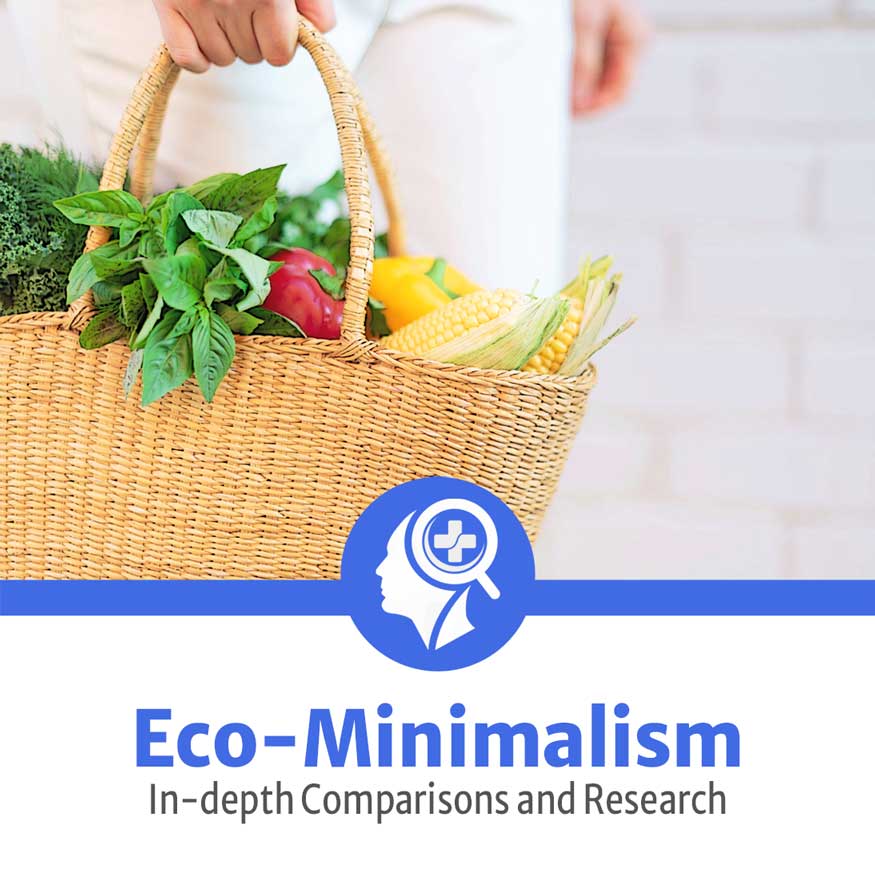
We should all be familiar with the term minimalism, but have you heard of the term eco-minimalism? Eco-minimalism has evolved to become a lifestyle that aims to use minimalism as a tool to reduce environmental impact.
Our team of researchers at FinditHealth found that while sustainable living and minimalism are different, they are incredibly powerful and can be achieved without changing your lifestyle too much. In this article, we will explore what eco-minimalism means, the benefits it brings to your life, and tips for getting started today.

Environmental Minimalist Meaning And Examples

The term “eco-minimalism” was introduced by energy consultant Nick Grant and his colleague architect Howard Liddell. It was considered a design concept to be used to construct buildings with minimal environmental impact.
Now it has evolved into a simple, sustainable lifestyle of consuming only what you need.
The concept is that limiting your material possessions to things you use regularly reduces the strain on the environment.
Eco-minimalists tend not to buy anything new unless it’s necessary and will last them for a long time. They also try to avoid purchasing any item made from synthetic materials because these products are seldom recyclable. They also can contain harmful chemicals that can pour into our waterways.
What Are The Benefits Of Eco-Minimalism?

There are numerous benefits of eco-minimalism, from helping the environment to improving your mental health.
Reduced waste
One of the most significant benefits of eco-minimalism is that it can reduce waste.
Less waste is produced when you only buy what you need and use everything you have. You can also look at composting and recycling for the waste you currently experience.
Healthier environment
Embracing an eco-minimalist lifestyle is one of the easiest ways to reduce your environmental impact. Because you will reduce the amount of waste you produce, the amount of energy you use, and the amount of pollution you create. This, in turn, makes a big difference for the planet and is essential to a healthier environment and world.
A lot of us don’t realize how much pollution is created with everyday things like plastic bags, straws, and even disposable diapers. All of this ends up in landfills further polluting our earth and causing problems.
By reducing your consumption of products like this, we can significantly reduce this type of waste. You can even start small by simply starting to recycle or up your recycling game.
Recycling trash means less garbage on the roads, and we would see huge improvements if everyone in the world started recycling daily. Another way to take a small step is to use public transportation or walk if able instead of driving. By using your car less, you contribute even less to pollution and global warming.
More Free Time
An eco-minimalist generally has more free time on their hands because they own less and are able to keep their lives more organized. It’s simple, really, but when you own less, it’s a lot easier to keep clean and organized. You only buy what you need, so not lots of time spent shopping, and there’s no extra drawer or closet for junk that never gets worn or used.
Better Mental Health
You can improve your mental health by embracing an eco-minimalist lifestyle. By owning fewer things, you can reduce stress and improve your mood because your life is full of the things you love and use daily. Eco-minimalists only own things they use every day, so there’s less clutter in their homes and lives. These can greatly reduce stress because it’s easier to relax when you aren’t searching through things to find what you are looking for.
Eco-Minimalism Tips

There are many simple things you can do to embrace this lifestyle. Getting started might take a little time and effort, but the benefits are well worth it. Small changes and encouraging zero waste living are a wonderful way to embrace eco-minimalism.
Simplicity
Eco-minimalism is all about simplicity and the concept of less is more. It’s being thoughtful about what you need on a daily basis and only buying what you need in the present moment. It’s also how you spend your time and who you surround yourself with.
You can get started by simply donating items you do not need. If you are cleaning out your closet, consider creating a capsule wardrobe. If you already recycle, consider other ways to go zero-waste and avoid products with excessive packaging. Simplicity is a wonderful theme to consider to help battle climate change and promote eco-friendly living.
Value
Do the items you own bring value and joy into your life? You want every piece you own to bring happiness into your life, and if it doesn’t, then time to donate. Your well-being greatly impacts your life and having items you value will only increase and promote positive well-being. Think about why the items bring so much joy into your lives and why you constantly reach for them.
Maybe the sweater reminds you of a first date, or the dress reminds you of a meeting that went well at work. You will find the more you simplify, the more you start to value the items you already own. You will have more time for the essentials of life, like spending time with family and more time in nature.
Sustainability
This is one of the most important principles and perhaps the most rewarding principle of eco-minimalists. By choosing to use and reuse items you are recognizing that we all share this planet and care for one another.
That we are all in this together and need to support one another. To focus on sustainability, consider purchasing quality goods that will be consistently used and last a long time. Also, consider how the item was made, the ingredients used, and how it was packaged. Reusable items are a wonderful way to practice sustainability but also allow you to refresh your wardrobe and keep your kitchen clutter-free.
How Are Eco-Living And Minimalism Different?

While both eco-friendly and minimalism focus on living consciously, they also differ. But both are very rewarding and encourage positive habits like sustainability, simplicity, and reusing items.
Minimalists believe in simplifying their lives by decluttering and consuming mindfully. It’s about identifying what is essential in your life, and focusing on less is better and quality items.
In contrast, an eco-friendly lifestyle focuses on living in a way that reduces its environmental footprint. People understand their actions impact the planet, and they do everything they can to reduce this impact. They will make sustainable choices like walking instead of driving, buying used over new, and preserving rather than replacing.
Minimalism and eco-minimalism are not the same, but they can go hand in hand. You can be both and it is easy for existing minimalists to make minor changes in their lifestyle that can affect the environment.

The Scandinavian minimalist lifestyle is a lifestyle philosophy that comes from the Nordic region of Europe. Its design is focused on simple, clean lines and functional pieces.
Scandinavian minimalism emphasizes comfort and coziness and uses natural wood as inspiration. They also focus on light as a celebration, especially during long, dark winters, because light conveys warmth and invitation. It’s a lifestyle that is geared towards creating a calm, serene, and inviting atmosphere that encourages us to see the beauty of nature.
Frequently Asked Questions


How do you become an eco-minimalist?
To become an eco-minimalist you will want to reduce your impact on the environment and embrace a minimalist lifestyle. The easiest way to start is to donate anything you do not use regularly, and also start recycling and composting weekly.
Why is eco-minimalism so popular?
Eco-minimalism is popular because it allows us to focus on our priorities and simplify our life while improving the environment and planet.
What is minimalism sustainability?
It’s the concept that we can use minimalism as a solution to a sustainable future. By clearing clutter from our physical life and mental mind, we make room for more experiences and create a more sustainable world.
Conclusion – Research by Findithealth.com


Eco-minimalism can give people a sense of clarity and peace they might not have had before. The researchers at FinditHealth found that if you want to practice sustainable living with a small environmental impact, then eco-minimalism may be for you.
By embracing eco-minimalism, you bring positive influences into your life, others, and the planet.

